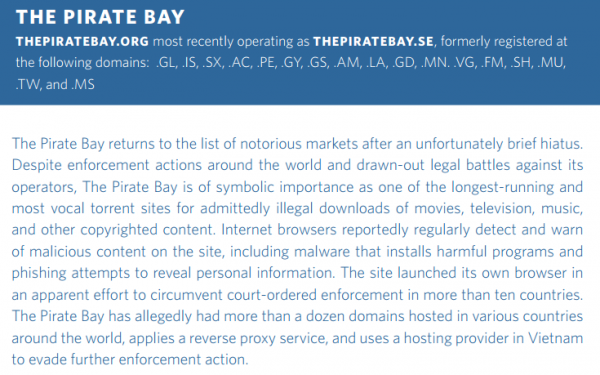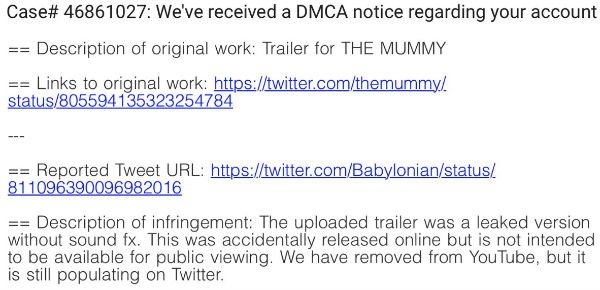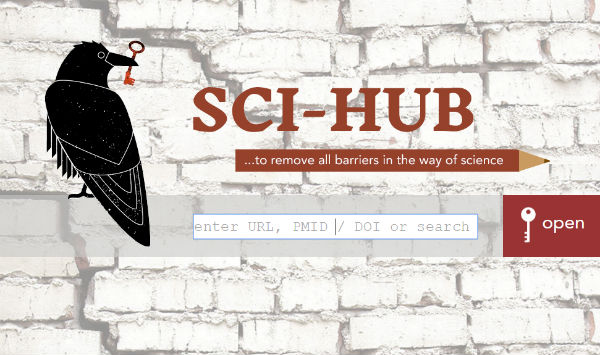US Government Targets Pirate Bay and Other ‘Piracy Havens’
jeudi 22 décembre 2016 à 17:06 In its yearly “Out-of-Cycle Review of Notorious Markets”, the United States Trade Representative (USTR) has listed more than a dozen websites said to be involved in piracy and counterfeiting.
In its yearly “Out-of-Cycle Review of Notorious Markets”, the United States Trade Representative (USTR) has listed more than a dozen websites said to be involved in piracy and counterfeiting.
The overview is largely based on input from industry groups including the RIAA and MPAA, who submitted their recommendations a few weeks ago.
While the USTR admits that the list is not meant to reflect legal violations, the goal of the review is to motivate owners and foreign Governments to take appropriate action and reduce piracy.
“The United States encourages all responsible authorities to intensify efforts to combat piracy and counterfeiting, and to use the information contained in the Notorious Markets List to pursue legal actions where appropriate,” the USTR announced.
As in previous years, The Pirate Bay remains one of the primary offenders.
According to the USTR, the site continues to facilitate downloading of copyright-infringing material. The Government further highlights the site’s resilience and “symbolic importance” as one of the longest-running pirate sites
“Despite enforcement actions around the world and drawn-out legal battles against its operators, The Pirate Bay is of symbolic importance as one of the longest-running and most vocal torrent sites for admittedly illegal downloads of movies, television, music, and other copyrighted content,” the report reads.

Other prominent torrent sites mentioned in the review are ExtraTorrent, Rutorrent, RARBG, and 1337x.to.
For the first time, USTR has also included a stream ripping site; YouTube-MP3.org. While this phenomenon has been around for a decade, the report includes a special “issue focus” mentioning it as an emerging threat.
“Stream ripping is an emerging trend in digital copyright infringement that is increasingly causing substantial economic harm to music creators and undermining legitimate services,” the USTR writes.
The mention follows a report from earlier this year, which also highlighted concerns about stream ripping. Soon after, several major music labels filed a lawsuit against YouTube-MP3 in a U.S. federal court.
A few newcomers aside, the review is mostly made up of familiar names, including 4shared, Putlocker, Nowvideo, Rapidgator and Uploaded, as well as several non-English language piracy portals and counterfeiting platforms.
In addition to individual sites and services, the USTR notes that some hosting services have also become piracy havens. The report specifically calls out the Swiss company Private layer for hosting the-watch-series.to, projectfree-tv, using a legal loophole.
The U.S has urged Switzerland to implement new legislation to make it easier to take action against pirate sites, but this hasn’t happened thus far.
The full list of the notorious online pirate sites and services that are highlighted in the report (pdf) are included below. The complete overview also contains various e-commerce and counterfeiting sites, including Alibaba’s Taobao.com.
—
– 4shared.com
– Beevideo.tv
– Bookfi and Libgen
– ExtraTorrent
– Gongchang.com
– Movshare group (allegedly operating Nowvideo.sx, Watchseriesfree.to, Videoweed.es, Novamov.com and others)
– MP3va.com
– Muaban.net
– Myegy.to
– Nanjing Imperiosus (domainerschoice.com)
– Pobieramy24.pl, Darkwarez.pl, Catshare.net and Fileshark.pl
– Private Layer hosted sites (including the-watch-series.to and projectfree-tv.to)
– Putlocker
– RARBG.to
– Rutracker.org and Rapidgator.org
– Taobao.com
– The Pirate Bay
– Uploaded.net
– Vibbo.com
– VK.com
– Youtube-MP3.org
Source: TF, for the latest info on copyright, file-sharing, torrent sites and ANONYMOUS VPN services.



 Yesterday morning very few people knew that a new version of
Yesterday morning very few people knew that a new version of 


 Last year, academic publisher Elsevier filed a
Last year, academic publisher Elsevier filed a 